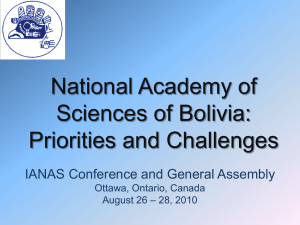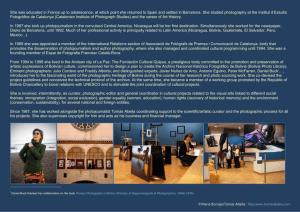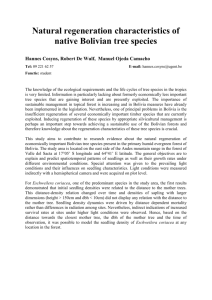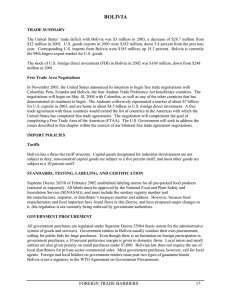BOLIVIA
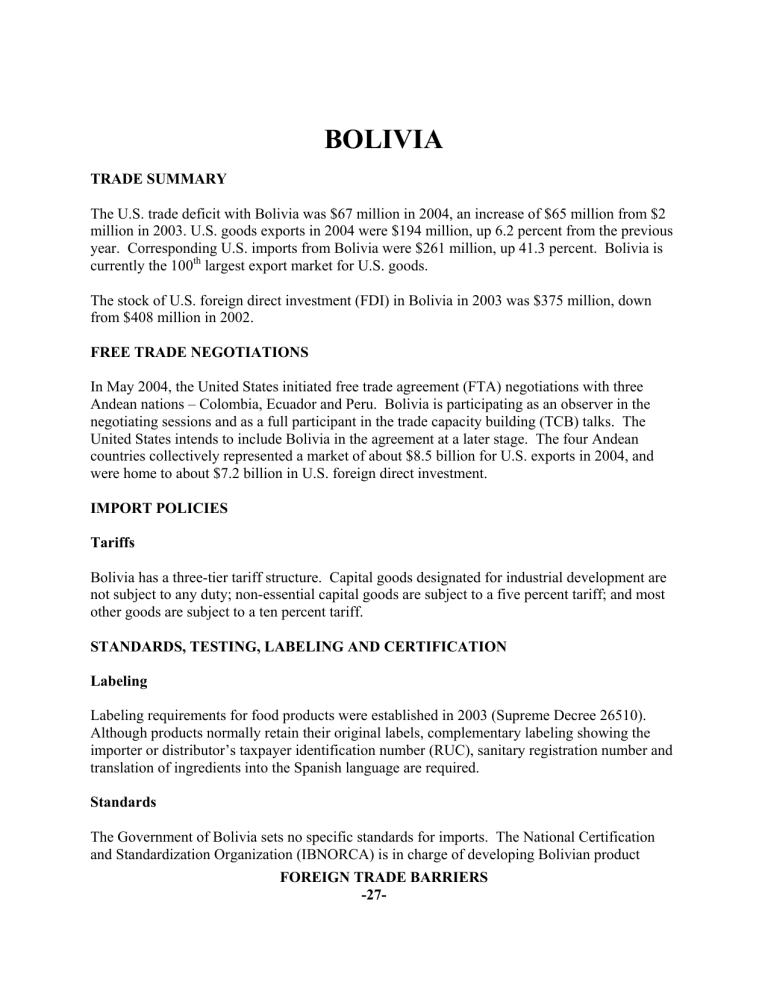
BOLIVIA
TRADE SUMMARY
The U.S. trade deficit with Bolivia was $67 million in 2004, an increase of $65 million from $2 million in 2003. U.S. goods exports in 2004 were $194 million, up 6.2 percent from the previous year. Corresponding U.S. imports from Bolivia were $261 million, up 41.3 percent. Bolivia is currently the 100 th largest export market for U.S. goods.
The stock of U.S. foreign direct investment (FDI) in Bolivia in 2003 was $375 million, down from $408 million in 2002.
FREE TRADE NEGOTIATIONS
In May 2004, the United States initiated free trade agreement (FTA) negotiations with three
Andean nations – Colombia, Ecuador and Peru. Bolivia is participating as an observer in the negotiating sessions and as a full participant in the trade capacity building (TCB) talks. The
United States intends to include Bolivia in the agreement at a later stage. The four Andean countries collectively represented a market of about $8.5 billion for U.S. exports in 2004, and were home to about $7.2 billion in U.S. foreign direct investment.
IMPORT POLICIES
Tariffs
Bolivia has a three-tier tariff structure. Capital goods designated for industrial development are not subject to any duty; non-essential capital goods are subject to a five percent tariff; and most other goods are subject to a ten percent tariff.
STANDARDS, TESTING, LABELING AND CERTIFICATION
Labeling
Labeling requirements for food products were established in 2003 (Supreme Decree 26510).
Although products normally retain their original labels, complementary labeling showing the importer or distributor’s taxpayer identification number (RUC), sanitary registration number and translation of ingredients into the Spanish language are required.
Standards
The Government of Bolivia sets no specific standards for imports. The National Certification and Standardization Organization (IBNORCA) is in charge of developing Bolivian product
FOREIGN TRADE BARRIERS
-27-
standards. In the near future, products for use in the oil and gas industry will have to comply with certain standard requirements.
GOVERNMENT PROCUREMENT
Since 1999, the control of the most significant entities once owned by the Bolivian Government has been in private (mostly foreign) hands. Government expenditures, however, still account for a significant portion of Bolivia’s GDP. The central government, regional governments (at the state and municipal levels) and other government agencies remain important buyers of machinery, equipment and materials, as well as of other products and services.
In an effort to provide incentives for local production, the government changed its purchasing rules in March 2004 (Supreme Decree 27328, dated 31 January 2004). Government purchases
(except insurance contracts) under $20,000 (U.S.) may be done through direct invitation and price comparison (minimum three quotes). The Government of Bolivia is legally required to call for tenders when purchases are above $20,000 and under $1,000,000. Importers of foreign products can only participate in these procurements if locally manufactured products and service providers are not available or a contract is not awarded. For proposed purchases of $1,000,000 to $1,875,000, local bids must be sought. Importers of foreign products face restrictions similar to those for procurements under $1,000,000. The government can call for international bids only for purchases over $1,875,000 and under $5,000,000. Suppliers submitting bids for purchases over $5,000,000 must comply with specified prerequisites, which are established in the bidding documents for each purchase.
INTELLECTUAL PROPERTY RIGHTS (IPR) PROTECTION
Bolivia belongs to the World Trade Organization (WTO), the World Intellectual Property
Organization (WIPO) and is a signatory of the Paris Convention for the Protection of Industrial
Property, the Berne Convention for the Protection of Literary and Artistic Works, and the
Geneva Phonograms Convention. Bolivia is on the U.S. Trade Representative’s Special 301
Watch List. In 1999, the Bolivian government established the National Intellectual Property
Rights Service (SENAPI) to administer IPR issues. In 2003, USAID began supporting the institutional development of SENAPI as a regulatory agency. As of December 2004, that process was not yet complete.
Bolivia’s existing legislation governing protection of IPR is insufficient, and enforcement efforts have been sporadic and largely ineffective. Piracy rates of videos, sound recordings and software remain among the highest in Latin America. The International Intellectual Property
Alliance (IIPA) estimates that piracy levels in Bolivia have reached 100 percent for motion pictures and 90 percent for recorded music. The 1992 Copyright Law recognizes copyright infringement as a public offense, and in May 2001 the new Bolivian Criminal Procedures Code began to provide for the criminal prosecution of IPR violations. In 2003, Bolivia had its first
FOREIGN TRADE BARRIERS
-28-
criminal IPR prosecution. However, laws are largely not enforced, and U.S. firms have had little success in getting justice in this area from Bolivian courts.
INVESTMENT BARRIERS
The 1990 Investment Law, together with other legislation, opened Bolivia’s economy to foreign investment. The law established guarantees such as equal treatment of foreign companies, the unimpeded repatriation of profits, convertibility of currency and the right to international arbitration in all sectors. In kind transfers are not allowed. Companies must follow the Bolivian commercial code to close down operations and then repatriate their capital. Bolivia is still discussing a bankruptcy law. Arbitration is limited to contractual rights. In the mid-1990s, the
Government of Bolivia implemented its “capitalization” (privatization) program. This program differs from traditional privatizations in that the funds invested by foreign investors: (a) could only be used to acquire a 50 percent maximum share of business equity of the former stateowned company; and (b) were directed into investment funds to support the pension system, rather than to the Bolivian Treasury.
Bolivia has signed bilateral investment treaties with several countries, including the United
States. The U.S.–Bolivia Bilateral Investment Treaty (BIT) entered into force in June 2001. The
BIT’s guarantee of recourse to international arbitration is important because U.S. companies are reluctant to pursue commercial disputes in the Bolivian legal system, fearing a prolonged, nontransparent and occasionally corrupt process.
The Bolivian hydrocarbons law, following Article 139 of the Constitution, stipulates that all hydrocarbons deposits, whatever their state or form, belong to the Bolivian government. No concessions or contracts may transfer ownership of hydrocarbon deposits to private or other interests. The government exercises its right to explore and exploit hydrocarbon reserves and trade hydrocarbon products through the state-owned firm, Yacimientos Petroliferos Fiscales
Bolivianos (YPFB). The law allows YPFB to enter into joint venture contracts for limited periods of time with national or foreign individuals or companies wishing to exploit and trade hydrocarbons.
In 1996, the Government of Bolivia reduced royalties paid to the Bolivian Treasury and local governments under these joint venture contracts and eventually attracted $3 billion in new investment to Bolivia. In 2003, the Bolivian government announced that it would review those contracts, as well as the entire capitalization process, to see if the needs of the Bolivian people were being served. As of December 2004, the Bolivian Congress was considering a draft hydrocarbons law that, if approved, could breach existing government contracts with investors by inter alia removing the companies’ right to freely commercialize natural gas.
FOREIGN TRADE BARRIERS
-29-
